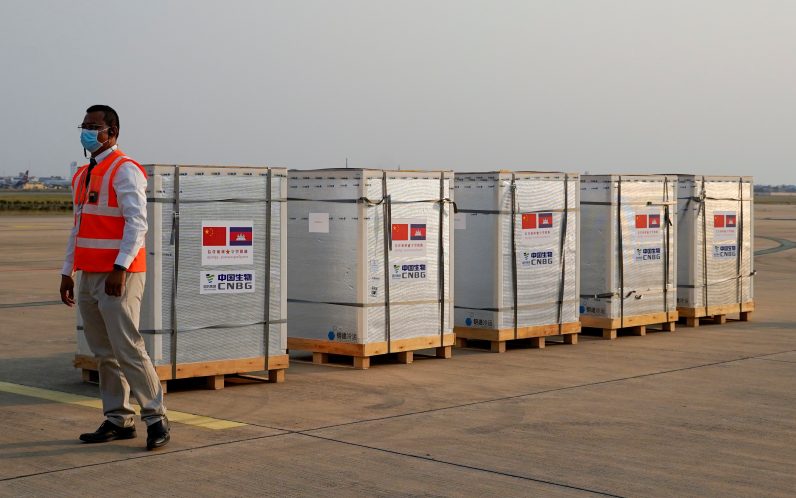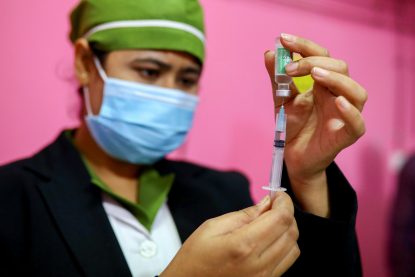
A worker stands next to the shipment of 600,000 doses of COVID-19 vaccines at Cambodia’s Phnom Penh International Airport Feb. 7, 2021. The vaccines were donated by China. (CNS photo/Cindy Liu, Reuters)
VATICAN CITY (CNS) — When the COVID-19 pandemic began in 2020, Pope Francis warned it could make inequalities existing around the world even worse.
While the discovery of COVID-19 vaccines offered a spark of hope for a world seeking a way back to normalcy, Aloysius John, secretary-general of Caritas Internationalis, said what Pope Francis warned about can been seen in the geographical distribution of the vaccines.
“Pope Francis was a prophet when he said this, but today we are living it,” John told Catholic News Service Feb. 9.
[hotblock]
While wealthier countries in the Global North are systematically vaccinating people, John said, the poorer countries of the Global South are trying to figure out how to pay for some doses.
The global network of Catholic charities has been taking every opportunity to remind the international community that “the poor matter also in the vaccine,” he said.
Another challenge, he said, is preparing poor countries, who “will be last on the list,” for the eventual arrival of the vaccine, since many lack the infrastructure to safely stock and preserve it.
Pfizer said its vaccine needs to be stored at between -80 Celsius and -60 Celsius (-112 Fahrenheit and -76 Fahrenheit), while Moderna said its vaccine must be kept frozen at between -25 Celsius and -15 Celsius (-13 Fahrenheit and 5 Fahrenheit).
“Everything is not the Global North,” John said. “So, if you look at the Global South, where it is 40 degrees (104 Fahrenheit) in the shade, how can you think of storing a vaccine at -60 degrees?”
But vaccine access, storage and distribution are not the only problems, John told CNS. The pandemic is a “protracted crisis” that has hampered people’s ability to “find the means to live, to find the means to survive.”

A nurse fills a syringe with the Oxford-AstraZeneca COVID-19 vaccine at Dhaka Medical College vaccination center in Dhaka, Bangladesh, Feb. 9, 2021. (CNS photo/Mohammad Ponir Hossin, Reuters)
And, he said, access to education is another challenge for vulnerable populations who don’t have access to digital forms of communication.
“For example, in Iran, (with) the digital way of teaching people today, more than 60% are left out,” John said. “In other parts of the world, this is a problem also because they cannot go to school. So, the challenge is how to ensure access to education.”
Hunger, poverty, forced migration, domestic violence and human trafficking all are on the rise because of the pandemic, he said, and Catholic charities are trying to respond.
In countries like Ukraine, the COVID-19 pandemic coupled with a decade-long war and several natural disasters created a perfect storm of crises that have engulfed the country. Andrij Waskowycz, president of Caritas Ukraine, told CNS Feb. 12 that on top of the 3.1 million people in need of humanitarian aid due to the war, the pandemic further “deteriorated the social situation because many people could not work for a long time and could not provide for their families.”
Although Ukraine’s President Volodymyr Zelensky announced a rollout of the vaccine sometime in February, Waskowycz said there is still no clear understanding of how the government will deal “with all these crises in one of the poorest countries in Europe.”
Waskowycz told CNS there also is “a deteriorating situation” in education since many children do not have access to computers for online classes. “This is a big, big problem and we have to implement systems so that children will not lose their years without education and schooling.”
One sign of hope does exist, though, he said. “People are helping each other and I think together they can overcome all these crises, all these problems that we are facing. But of course, my biggest hope is that we can have mass vaccination of the population in Ukraine.
Annette Waechter-Schneider, deputy secretary-general of Malteser International, the charitable arm of the Knights of Malta, told CNS Feb. 9 that the organization continues to work on the front lines providing preventative care in areas “where people are lacking access to basic necessities, be it food, be it health care.”
The charity has not begun setting up vaccination sites, she said, because “the major bottleneck, as we all know, is the limited availability of vaccines around the world.”
Pope Francis “is very right in pointing to the frightening rise in inequalities” in the world due to the pandemic, Waechter-Schneider said. “This is not only rising due to a shortage or lack of access to vaccines.”
“Something that gets lost in the whole discussion,” she said, “is that there are more people dying of lack of food currently than over the lack of vaccines.”
While Malteser International is working to mitigate the pandemic’s impact in poor countries, Waechter-Schneider said that the international community must also do its part in aiding vulnerable populations.
PREVIOUS: On Ash Wednesday, Philippine archdiocese to let families distribute ashes
NEXT: Spanish lawyers act to prevent removal of crosses by local officials


Share this story